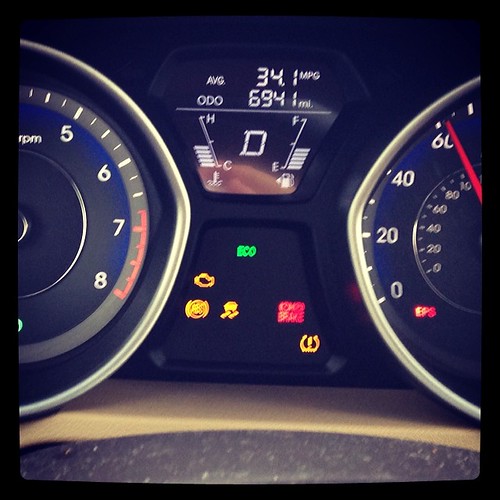
It’s fascinating how much a person’s car can reveal about their inner world, isn’t it? We often think of our vehicles as mere transportation, a way to get from point A to point B. But what if that mobile metal box is actually a secret window into someone’s mental state?
Turns out, the interior of a man’s car might just be “the looking glass into their mind,” capable of “revealing how stressed or overwhelmed they may be.” Just like our homes, our cars are personal spaces, and the way we maintain them—or don’t—can speak volumes. If a well-kept car suggests “responsibility, self-discipline, and an organized mindset,” then a car filled with chaos often hints at a mind that’s equally turbulent.
So, if you’re wondering what’s really going on beneath the surface for a guy in your life, sometimes all it takes is a peek inside his ride. Small details, from neglected maintenance to overwhelming clutter, can paint a larger picture about his well-being, giving away signs that he’s mentally checked out of life. We’re about to explore some of these tell-tale automotive confessions.

1. **Trash and Clutter**Let’s kick things off with something immediately noticeable: the state of his car’s tidiness. If a man’s car is consistently “filled with trash and always looks messy and unorganized,” it’s often a significant indicator that “he has mentally checked out.” It’s not just about a few stray items; we’re talking about weeks of “greasy bags,” “empty energy drink cans everywhere,” and even “old coffee cups rolling around.”
While a little clutter might be normal after a long trip, the sheer “lack of motivation to clear it out” can be a glaring sign that the car’s owner is “overwhelmed and stressed in some way.” It’s a deep-seated indifference to his immediate environment that suggests a mental disengagement from daily routines. The accumulation of “fast-food bags piled in the backseat” and other debris shows a habit of “not cleaning up,” pointing to someone who “doesn’t care much about their environment anymore.”
This isn’t about mere laziness; it’s a reflection of a deeper internal struggle. When a person allows their personal space to collect clutter, it has a direct correlation to “the person’s overall satisfaction with their life and self.” If a man is feeling “mentally drained,” he often “lack[s] the energy to clean out his car,” prioritizing what he perceives as more “significant” aspects of his life. This visible messiness often “shows the disengagement he is experiencing in his life,” running on autopilot without the drive to maintain order.
The presence of “empty energy drink cans everywhere” further illustrates this point. It “suggests exhaustion, burnout, or relying on quick fixes instead of real rest.” This kind of dependence “hints that he’s mentally checked out from healthier coping strategies,” choosing temporary boosts over genuine restoration. Similarly, “old coffee cups rolling around” signal a life of “rushing through life without pausing for self-care,” indicating emotional fatigue and a profound mental check-out.
Read more about: The Definitive Guide to Restoring Your Car’s New-Car Scent: A Consumer Reports Deep Dive

2. **Warning Lights Ignored / Overdue Maintenance**Next up, let’s talk about those ominous little symbols that light up on the dashboard. “When a man’s car dashboard is consumed with warning lights and he chooses to take no initiative towards resolving these urgent issues,” it’s a strong signal that “he may be undergoing a mental checkout.” This isn’t just a minor oversight; it’s neglecting “overdue maintenance lights ignored” for “weeks—or even months.”
Ignoring these critical alerts is more than just about the car; it “reflects a wider sense of disengagement from responsibility.” If he’s unable to bring himself to address the needs of his vehicle, there’s a high probability that “he’s struggling elsewhere.” It’s “one of the clearest signs someone is mentally checked out” when they allow necessary repairs to go unaddressed. As the context states, “Cars need care, and ignoring that often parallels ignoring self-care.”
This procrastination isn’t accidental; it’s a symptom. “When someone procrastinates the things they know are important, it’s a sign that they are struggling to be productive.” The underlying causes can be profound, as “research shows that having trouble being productive can be caused by a lack of focus or being easily distracted, which are normal responses to feeling mentally checked out.” The energy and mental bandwidth required for simple problem-solving are simply absent.
The sheer volume of warning lights, coupled with the continued delay in addressing them, signifies a significant mental block. It’s a visible representation of an internal state where the individual is “running on fumes in life as well as on the road.” The inability to act on urgent matters, even those with clear consequences, serves as a powerful indicator that “he’s mentally checked out from adult responsibilities,” allowing issues to compound rather than tackle them head-on.
3. **Unopened Mail**Now, let’s shift our gaze to the stacks of paper that might be lurking in his car. “If he has unopened mail throughout his car, he is most likely experiencing a disconnect with his life due to being overwhelmed and feeling burnt out.” This isn’t about forgetting to grab the mail; it’s about “stacks of unopened envelopes tossed on the seat or dashboard,” signals that are hard to ignore.
This particular type of clutter goes beyond mere tidiness. It suggests that “bills, notices, and letters become too overwhelming to deal with, so they pile up.” The act of leaving mail unopened, sometimes for extended periods, is a clear manifestation of avoidance. This behavior “often reflects stress or an inability to manage responsibilities.” When a car starts resembling “a mailbox on wheels,” it’s more than just clutter; it’s “a sign of mental overload.”
The World Health Organization provides valuable insight here, identifying “burnout as an occupational phenomenon that results from stress at work that a person has trouble managing.” When a man is grappling with this kind of stress, it profoundly impacts his capacity for engagement in other areas of his life. Consequently, “it makes it more difficult for him to be actively involved in the tasks he must complete within his personal life,” leading to the neglect of seemingly urgent matters like his mail.
Seeing “a car full of unopened mail” is “one of those unmistakable signs he’s mentally checked out.” It indicates a person who is not just avoiding car-related tasks but is likely “also avoiding other urgent matters, too.” The weight of these accumulated responsibilities, even simple ones like opening an envelope, becomes too heavy, and the easiest path seems to be to simply ignore them, hoping they’ll somehow disappear.
Read more about: Beyond the Hue: Unpacking the Complex Layers of Donald Trump’s Public Persona and Enduring Impact

4. **No Sign of Personal Hobbies / Lack of Personal Items**Sometimes, what’s *missing* from a man’s car can be just as telling as what’s present. While we often look for signs of neglect, a “lack of things” can also “pinpoint how he is feeling mentally.” We’re talking about the absence of items that reflect personal passions, interests, or anything that speaks to his unique identity outside of the daily grind.
A significant part of anyone’s life revolves around their hobbies and personal pursuits. When someone feels profoundly “disengaged with their life,” this disengagement inevitably “seep[s] into every aspect of their life, including their extracurricular activities.” If his car, which could otherwise hold a fishing rod, a gym bag, art supplies, or even a favorite book, is completely devoid of such personal touches, it raises a red flag.
Psychologists have a term for this profound “loss of joy,” calling it “anhedonia.” It’s a feeling of numbness where activities that once brought immense pleasure no longer hold any appeal. “One of the main causes of this feeling of numbness is depression, which is a mental struggle that shares characteristics with feeling mentally checked out of life.” The core common characteristic here is a pervasive “disengagement” that leaves little room for personal expression or enjoyment.
The absence of “personal hobbies” in his car suggests that his “sense of purpose and drive may wane, leaving him feeling directionless and unfulfilled.” It’s a subtle but powerful indicator that the spark for life’s enjoyable moments has dimmed, mirroring an internal state where he might be “mentally checked out” from the very things that make life vibrant and meaningful. This quiet void speaks volumes about his emotional state.
Read more about: Navigating the Scarcity: 8 Essential Ways to Unearth Parts for Your Beloved American Classics

5. **Silent Radio**Now, let’s turn our attention to the ambient sounds—or lack thereof—within his vehicle. If you frequently find a man “commonly driving around with the radio silent,” especially if he was once someone who “would always listen to music while driving,” it can be a significant sign that “he knows he is mentally checked out.” The silence here is not just an absence of noise; it’s a deeper symptom.
When someone is “mentally checked out of their life,” they don’t just disengage from their hobbies; “they will also become disconnected from their surroundings altogether.” This can manifest as an indifference to the usual comforts or stimuli, like music or talk radio. The quiet ride signifies a detachment, a retreat into oneself where external engagement, even passive listening, feels like too much effort.
Interestingly, this silence can be interpreted in two ways. While it certainly points to a man “being disconnected,” it “may also show signs of him being aware of his current state of mind and being eager to find ways to recharge himself mentally.” In this context, the silence becomes a deliberate choice, an attempt to create a peaceful space. “Silence helps regrowth occur in the brain as well as reduce cortisol levels, which helps to aid in the reduction of stress, and ultimately helps someone get out of a mental slump.”
So, while a perpetually silent radio can indicate a profound mental check-out and disengagement, it might also be a coping mechanism, a desperate attempt to create a calm sanctuary in a mind overwhelmed by stress. It’s a subtle yet telling detail that reflects an individual trying to navigate a challenging internal landscape, often by minimizing external demands and stimuli.
Read more about: Unpacking the Past: 14 Vintage Car Features Modern Driving Left Behind (And Why We Miss Them)

6. **Expired Air Freshener / Overwhelming Smell of Neglect**Finally, let’s consider something you might *smell* before you even see it. If “an expired air freshener is hanging around the rearview mirror of a man’s car,” it signals a potential mental check-out. This tiny detail might seem insignificant, but in the context of a disengaged mind, “when you are feeling a huge disconnect from your life, even the small tasks seem too much to manage, and it is hard to feel motivated.”
The state of the car’s scent, or lack of care for it, can be incredibly revealing. An “overwhelming smell of neglect,” whether it’s “stale smoke, old food, or sour gym gear,” says “what visuals sometimes can’t.” When someone ceases to care about the atmosphere and cleanliness of their environment, it typically “reflects internal struggles.” A car that consistently “reeks isn’t just uncomfortable—it’s a warning sign” of deeper issues.
When “a small task feels impossible, it is not a sign of laziness, but rather a sign that your mind is struggling to find the motivation to complete tasks that you once did without thinking.” Motivation itself is often linked to dopamine levels in the brain. As Dr. Sarah Edwards, a cognitive behavior and emotional reconsolidation therapist, explains, “Without enough dopamine, in the dorsal striatum, we don’t have the wherewithal to do even the routine tasks we once did automatically day in and day out without thinking.”
This neglect of a simple fix like replacing an air freshener, or the persistent presence of unpleasant odors, highlights a profound indifference to one’s surroundings and comfort. If “he can’t smell the problem,” it’s often “because he’s already mentally checked out.” It’s a clear indication that the basic acts of maintaining a pleasant environment have fallen by the wayside, signaling a broader emotional fatigue and disengagement from life’s small joys.

7. **Worn-out work items**Sometimes, it’s not just about what’s missing, but what’s *present* yet neglected, especially when it comes to a man’s professional life. If a guy who once lived and breathed his job, someone who took immense pride in his presentation and truly found meaning in his work, now has worn-out, uncared-for work items scattered throughout his car, it’s a strong signal. This isn’t just about a scuffed briefcase; we’re talking about a visible decline in the tools or attire he uses for his occupation, hinting that he might be mentally checked out of that vital part of his life.
This subtle yet profound shift is often a mirror of what’s happening internally. When someone feels “mentally checked out,” they frequently “lose interest in pursuing your personal goals or feel disconnected from your long-term aspirations.” This disengagement isn’t limited to leisure; it seeps into their professional world, too. The “sense of purpose and drive may wane,” as explained by Launch Centers, a team of clinical professionals, leaving him “feeling directionless and unfulfilled.” The worn-out items become a tangible representation of this eroded passion.
Think about it: the little things you do to maintain your work gear, like polishing your shoes or organizing your laptop bag, are often unconscious acts of respect for your profession and yourself. When those actions stop, and the items become visibly neglected, it suggests a broader indifference. It’s a quiet declaration that the spark he once had for his career has flickered, revealing a deep-seated mental fatigue that makes even basic upkeep feel insurmountable.
This sign is especially poignant because work is such a central pillar for many men’s identities. To see a man’s professional pride diminish, reflected in the state of his work-related items, is to witness a core part of his engagement with life fading. It’s not about being materialistic; it’s about the care and attention, or lack thereof, given to the things that support his livelihood and, historically, his sense of accomplishment.
Read more about: Navigating the Scarcity: 8 Essential Ways to Unearth Parts for Your Beloved American Classics

8. **Dirty clothes covering the backseat**Let’s move to something a bit more… personal. Just like a car overflowing with trash, if a man’s backseat is consistently draped in dirty clothes, it’s a pretty telling sign of the overwhelmed state his mind might be in. It’s not just a laundry hamper on wheels; it’s a double whammy of neglect, revealing an indifference to both the cleanliness of his vehicle and, perhaps more importantly, his own appearance and self-care routines.
This isn’t about being perfectly tidy all the time—we all have those moments. But a persistent “wardrobe in the trunk” or “clothes and shoes tossed around inside” signals that daily routines are slipping. This kind of disorganization “can signal difficulty with structure, boundaries, or motivation,” as some experts point out. It’s like the internal chaos is spilling out, making the car a repository for everything that’s just too much effort to deal with properly.
While being mentally checked out isn’t a clinical mental illness, it does share common traits with conditions like depression and anxiety. These states often “impact a person’s eagerness to keep up with hygiene and appearance.” When someone is “emotionally exhausted,” even fundamental tasks like self-care, which includes taking care of one’s clothes and personal presentation, become “overlooked.” The dirty clothes are a silent cry of “I’m too tired to even process this.”
So, when you spot that pile of neglected garments, it’s not just a messy car; it’s a visible manifestation of a deeper struggle. It suggests he’s mentally checked out of maintaining a sense of order, both around him and perhaps even within himself. It’s a subtle reminder that his daily life balance might be seriously off-kilter, and the simple act of putting clothes away has become an insurmountable hurdle.

9. **Almost-empty gas tank**Here’s a sign that’s both literal and deeply metaphorical: the dreaded “almost-empty gas tank.” If a man’s car is consistently running on fumes, and he shows zero urgency to refill it, even with the looming threat of being stranded, it’s a huge red flag. This isn’t just about poor planning; it’s about a profound mental check-out from life’s basic necessities and the consequences of neglecting them.
An empty gas tank isn’t just a physical reality; it’s often a “metaphorical representation of the exhaustion and emptiness he is most likely experiencing within his mind.” Think about it: running on empty on the road mirrors running on empty in life. It vividly illustrates his “lack of motivation and his neglect of the basics.” He’s pushing through, trying to get by, but without the crucial fuel to keep going effectively.
What’s particularly telling is that he “most likely does not want to neglect something like this.” This isn’t intentional carelessness; his “mental state is just having difficulty getting him to the point of taking care of the issue.” The mental energy required to anticipate, plan, and execute even a simple task like going to the gas station feels overwhelming. It’s a clear indicator that his capacity for proactive problem-solving, even for essential daily functions, has severely diminished.
Driving with the gas light on, day after day, week after week, showcases a deep-seated indifference to future problems and an inability to engage with preventative measures. It’s a classic sign of someone who’s mentally checked out, operating on autopilot and hoping things will just somehow work out, even as the metaphorical and literal fuel gauges plummet. It’s not about the cost of gas; it’s the cost of mental fatigue.

10. **Expired registration or inspection stickers**Now, for a sign that carries not just inconvenience, but actual legal consequences: expired registration or inspection stickers. If that important paperwork is “sitting neglected,” perhaps in his middle console, displaying a past-due date, it’s a blaring alarm. This isn’t “rarely an oversight—it’s avoidance.” It tells you he’s probably “avoiding completing such an urgent task because he is mentally checked out of his life.”
Ignoring these vital documents is a tangible clue that “responsibilities are falling through the cracks.” And let’s be real, these aren’t just minor slips; “these lapses can lead to tickets or bigger problems down the road.” When a man lets something this critical slide, especially knowing the potential repercussions, it points to a significant mental block. It’s “often not about money, but energy and focus being elsewhere,” utterly consumed by an internal struggle.
This behavior can often be linked to “executive dysfunction,” which mental health conditions can cause. Executive functioning skills are those crucial abilities that “encourage someone to complete tasks, have good time management, and manage other things like relationships.” When these skills are hindered, it “would explain why someone who is mentally checked out may be less likely to feel motivated to showcase these certain behaviors.” The mental bandwidth for these “adult responsibilities” simply isn’t there.
So, when you spot those out-of-date stickers, it’s not just a casual forgetfulness. It “screams he’s mentally checked out from adult responsibilities,” demonstrating a profound disengagement from the structure and demands of everyday life. It’s a visible symbol of how deeply overwhelmed he feels, to the point where even legal obligations become too heavy to lift.

11. **Dusty dashboard**Let’s get down to the nitty-gritty: the dusty dashboard. While it might seem like a small thing, a consistently neglected interior, especially a “dusty dashboard” that makes the car look perpetually “overlooked,” can speak volumes. “A well-maintained car benefits a person’s mental state,” so if a man’s car looks like it hasn’t seen a wipe-down in ages, it suggests he “may be mentally checked out of his life.” It’s a sign he’s stopped caring about the things that would genuinely make him feel better.
When someone “loses the desire to even do the things that would make them feel more positive mentally,” it’s usually rooted in a “lack of motivation to do so and feeling mentally overwhelmed with other aspects of their life.” Cleaning your car, even just wiping down the dash, can be a small act of self-care, a way to reclaim a tiny bit of control and create a more pleasant environment. But for someone checked out, even that minor effort feels like climbing Mount Everest.
The context actually highlights the positive impact of this kind of maintenance. “Just by keeping up with his car, he would experience a boost in his overall mood, productivity, focus, and stress, and he would gain back a sense of control in his life.” The fact that he’s ignoring these potential benefits means he’s so mentally drained that he can’t even perceive or access the simple acts that could offer some relief.
Therefore, a persistently dusty dashboard is more than just untidiness. It’s a quiet indicator that he’s reached a point of profound mental fatigue and disengagement. While it won’t “completely cure the mental drain and disengagement,” taking that first step, like wiping away the dust, is recognized as “a start in the right direction of trying to overcome mental checkouts.” The neglect suggests he’s not even ready for that start.
Read more about: Navigating the Scarcity: 8 Essential Ways to Unearth Parts for Your Beloved American Classics

12. **Dead electronics and chargers everywhere**Finally, let’s talk about the tech graveyard that might be inhabiting his car: “old phones, broken chargers, or tangled cables scattered around.” It’s a telling visual, often representing a deeper internal state. These “abandoned gadgets” are more than just clutter; they “often represent stalled energy and a lack of follow-through.” They’re relics of projects started but never completed, connections attempted but now broken.
Think about it: who keeps broken tech or tangled, non-functional cables in their car unless they’re truly disengaged from their surroundings? These items “clutter the space without serving any real purpose.” Instead of making the effort to either fix them, recycle them, or simply toss them, “he just leaves them behind.” This inaction speaks volumes about his current mental bandwidth and his ability to address even minor organizational tasks.
This particular sign is another hint that “he’s mentally checked out and not fully engaged.” It’s a physical manifestation of a mind that’s too overwhelmed or apathetic to deal with small problems, even if they contribute to general disarray. The lack of resolution for these trivial issues suggests a broader pattern of disengagement, where problem-solving and tidiness have fallen by the wayside.
It’s like these forgotten devices are a metaphor for himself: once active and functional, now just abandoned, collecting dust, and not serving their purpose. They become a poignant reminder of potential unfulfilled or tasks left undone, echoing the internal “stalled energy” that defines a mentally checked-out state. It’s not just a messy car; it’s a car filled with static.
**The Car’s Story: Beyond the Chrome and Engine**
It’s truly incredible, isn’t it, how much a humble car can mirror the complex landscape of a man’s mind? From the unaddressed warning lights to the silent radio, and from the neglected registration to the graveyard of dead electronics, each detail tells a compelling story. These aren’t just random acts of sloppiness or forgetfulness; they’re subtle yet profound indicators that someone might be “mentally checked out” from the vibrant rhythm of life.
Spotting these signs isn’t about judgment; it’s about observation and understanding. It’s a gentle invitation to look a little closer, to recognize that sometimes, the disarray in a personal space like a car can be a silent cry for help or a signal that someone is running on empty.
A car’s condition often acts as a non-verbal cue, offering insights into battles fought silently within. So, the next time you peek inside a man’s vehicle, remember that it might be more than just a ride. It could be a powerful narrative, a personal diary written in discarded coffee cups, expired paperwork, and forgotten gadgets. These clues can be the first step towards a much-needed conversation, a way to connect and offer support to someone who might be struggling to keep all their wheels turning. After all, everyone deserves a full tank and a clear view of the road ahead, both literally and figuratively.



